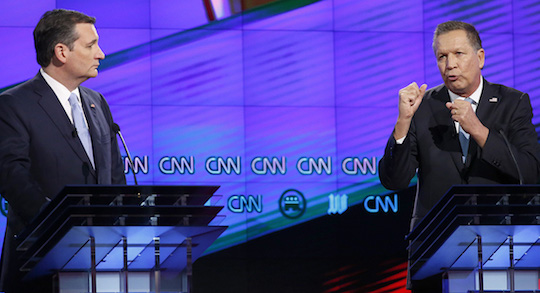
There is no Trump message. There’s not enough of one, anyway. His signature move, rhetorically, is to deplore the problem for 45 seconds and praise the solution for his remaining 15. We’re going to have better deals with China, and it’s going to be great. We’ll get rid of illegal immigrants. If you ask him where he plans to hold the illegal immigrants before he deports them but after he rounds them up, he says it will be great. From a message standpoint, his campaign is like if you went car shopping, and one guy was just selling a picture of you and him riding in a Corvette with boners.
His message doesn’t make sense to me. But it makes sense to a lot of people, and more of them have voted for him than for any other Republican candidate. They can’t all be dumb. Some of them must like something about him besides that he is brightly colored and easy to understand. There is a Trump message. It is under-articulated and thick, like a walrus flipper, but it is strong enough to heave his campaign up onto the ice floe of popular democracy, where it can devour the penguins of cable news. He’s saying something, and it’s not “make America great.” It’s make America great again.
The oft remarked premise of this slogan is that America sucks now. He’s not wrong. Something does suck about America in 2016. It started in the last decade, when George W. Bush made the economy work really well for rich people until it broke. Don’t worry: it’s working well for rich people again.
That’s how you get a candidate like Trump. For the last 30 years or so, the American system has worked increasingly well for a dwindling number of people. When the middle class shrinks and the ruling class gets richer but stays the same size, society gets weird. People lose confidence in the existing system. Their taste in leaders becomes more personality-driven, because they don’t believe specific policies will get anything done. They’re cynical and broke. They don’t care how we fix this broken system. They just want some dynamo to cut through the bullshit and set things right—someone to make America great again.
Trump’s message is “everything sucks, and I will undo it.” It’s a call to either action or apocalypse, depending on how far you think it through. I think it’s nuts. But if you only consider it for a second or two—basically, the time it takes to decide whether you like that guy—it’s true. The first part is, anyway. America is not great right now. The system has become unfair. We used to be the country that didn’t care who your dad was, but then the president’s son fucked it up.
Or immigrants and women’s studies majors did it—it depends on what meetings you go to. On one side of that divide, the president’s wife has offered to make things more fair and merit-based, plus fight another war to clean up after the last two. On the other side, “make America great again” has won more delegates than “make America constitutional again” and “neither of these maniacs.” But it hasn’t won a majority. The GOP could broker its convention and keep Trump from detonating the party and/or United States of America.
But maybe they shouldn’t? If Trump wins the most delegates and somebody else wins the nomination, the GOP will prove him right. It will demonstrate the truth of his message and disappoint its largest single bloc of voters in one stroke. The Republican Party blackballed the guy who said democracy is rigged even though he got the most votes, huh? I guess I’ll vote for Clinton—no, Hillary Clinton.
FiveThirtyEight believes people agree with Trump’s message that the Republican nominating process is rigged if it doesn’t give him the nomination. Quote:
Last week’s NBC News/Wall Street Journal poll found that 62 percent of Republicans thought the “candidate with the most votes in the primaries” should become the nominee in the event that no candidate wins a majority of delegates, compared with 33 percent who said Republicans should choose the “candidate who the delegates think would be the best nominee.” Only 40 percent of Republicans had Trump as their first choice in the same poll, which implies that there’s a group of Republicans who personally don’t prefer Trump but wouldn’t want to deny him the nomination if he finished with the plurality of delegates and votes, as he is almost certain to do.
The Republican Party stands to lose more than Trump supporters if it nominates someone else. I submit that denying him the nomination would make his message more convincing—the larger one about how this country works, not just his micro-message about the convention. I don’t care for Donald Trump. I think he is a symptom of an unhealthy democracy. But I don’t know if another insult to our system will cure it.





